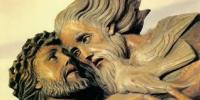
The Discourses of the Last Supper are a probably a collection of the teachings of Jesus which the evangelist has placed in the context of the Last Supper. Indeed they seem very fitting for this time, even though it would have been impossible for them to have been recorded verbatim. The mood is sorrowful, for Jesus is saying farewell to his beloved friends, yet it is also one of hope in its revelation. Jesus, who is going to face a horrible death the next day, is gently, unselfishly comforting his frightened disciples. They have every reason to be troubled. Jesus has foretold both the betrayal of Judas and the triple denial of Peter. He, their master, is telling them they cannot follow him and they must sense as well that they are all in very great danger. Jesus, however, is always in control of the situation. He knows that he will be glorified and will glorify the Father.
Like the skilful dramatist he is, John uses the plain-speaking disciples Thomas and Philip to elicit from Jesus what he has already described in the prologue. In last week’s gospel Jesus had used the images of shepherd and gateway for himself and this theme is taken up more powerfully in the words:
“I am the Way, the Truth and the Life.
No one can come to the Father except through me.
If you know me, you know my Father too.”
This puzzles Philip and he asks the next question:
“Show us the Father.”
Jesus seems somewhat exasperated. However, for the Jews the one God was a being of power and might whose name Yhaweh could not be spoken and whose voice was heard chiefly through their leaders and the prophets. The fact that they could see the Father in their friend Jesus, who was human, was an invitation to unimaginable intimacy.